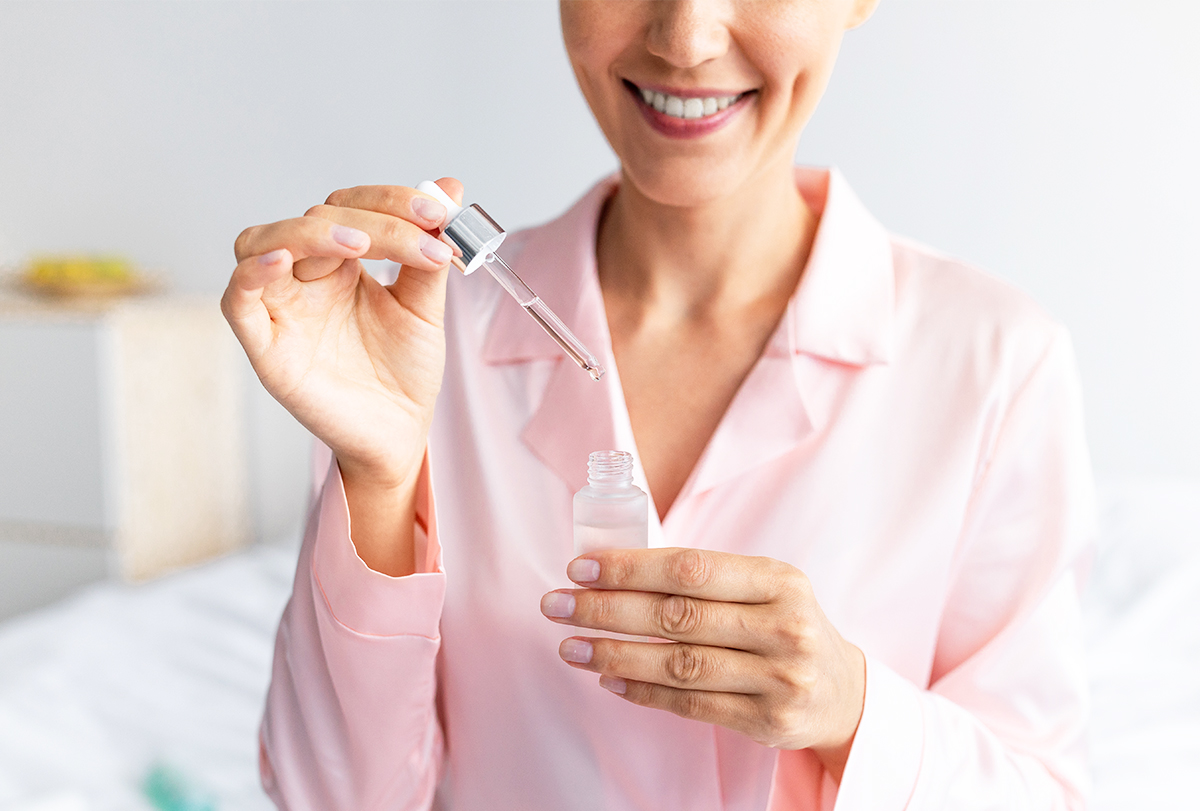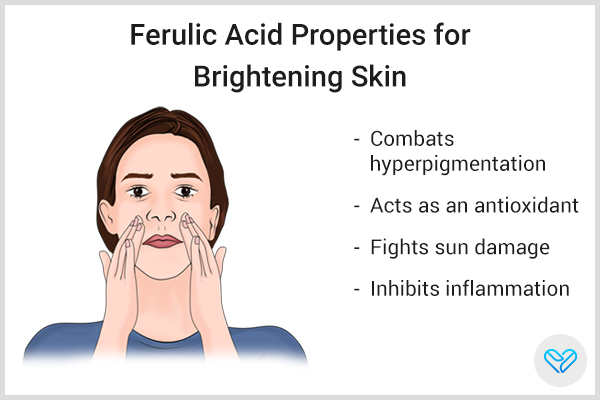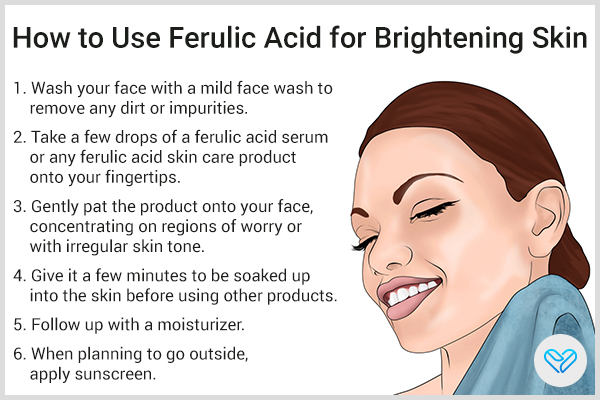In this article:
People’s innate desire for a glowing and young complexion has led them to a variety of skin care ingredients that claim to work wonders. One such ingredient that has earned a good name in the current times for leading to beautiful skin is ferulic acid. (1)

But does ferulic acid really have the capacity to light up your skin and enhance its appearance? Yes, it does! It’s simply because of its antipigmentation action. (2)
This article will delve into the science behind ferulic acid and its potential skin benefits.
How Does Ferulic Acid Brighten Skin?
Ferulic acid (FA) is a natural compound with antioxidant properties that can be found in various plants. The body breaks down specific amino acids from the foods you eat, and this leads to the production of ferulic acid. (1)
You can also find ferulic acid in fruits such as oranges and sweet corn and vegetables such as tomatoes and carrots.
What sets ferulic acid apart is its unique structure, which enables it to shield the body against damage caused by free radicals. Free radicals are dangerous molecules that can harm body systems and thereby cause a lot of health problems.
Ferulic acid contains specific components that can neutralize these free radicals, preventing them from causing further harm. (1)

When it comes to brightening your skin, ferulic acid works its magic in several ways.
1. Combats hyperpigmentation
Uneven skin tone, characterized by dark spots and discoloration, is a problem that affects many people globally. Ferulic acid has been found to inhibit the release of melanin, which gives your skin its color.
By reducing excess melanin production, ferulic acid can assist in vanishing any dark spots and evenly toning out your skin, revealing better-looking skin. (2)
2. Acts as antioxidant
Ferulic acid is a potent antioxidant that helps defend your skin against harmful molecules called free radicals. These free radicals can damage your skin cells and contribute to aging.
By neutralizing these pesky free radicals, ferulic acid helps prevent skin damage, keeping your complexion looking fresh and youthful. (1)
3. Fights sun damage
Sun exposure can cause substantial harm to your skin, causing dark spots and early-onset aging.
Research suggests that ferulic acid can enhance the efficacy of sunblock and deliver extra safety against harmful UV rays. By shielding your skin from sun damage, ferulic acid contributes to a more radiant and even-toned complexion. (3)(4)
4. Inhibits inflammation
Inflammation can leave your skin looking red, irritated, and dull. Ferulic acid possesses anti-inflammatory properties that help calm and soothe the skin. By reducing inflammation, it can restore your skin’s natural radiance and promote a healthy complexion. (4)
Potential Side Effects and Precautions
Skin care products that contain ferulic acid are generally regarded as safe to use. However, it’s crucial to be mindful of any known allergies you may have to foods that contain ferulic acid.
Caution: To ensure your safety, experts recommend conducting a patch test before using products containing ferulic acid. By doing a patch test, you can check for any adverse reactions or sensitivities to ferulic acid and take the necessary precautions to avoid its potential side effects.
How to Use Ferulic Acid for Brightening Skin

To use ferulic acid for brightening the skin, follow these simple steps:
- Wash your face with a mild wash to remove any dirt or impurities.
- Take a few drops of a ferulic acid serum or any ferulic acid skin care product onto your fingertips.
- Gently pat the product onto your face, concentrating on regions of worry or with irregular skin tone.
- Give it a few minutes to be soaked up into the skin before using other products.
- Follow up with a moisturizer.
- When planning to go outside, apply sunscreen.
Most-Asked Questions
How long does it usually take to see improvements in the skin when using ferulic acid?
The time it takes to notice improvements can differ from person to person, but you can generally expect improvements in skin texture and appearance within a couple of weeks of regular use.
Can ferulic acid be used during the day?
Yes, you can apply ferulic acid during the daytime.
Is ferulic acid safe for sensitive skin?
If you have sensitive skin, it’s recommended that you start with lower concentrations of ferulic acid and patch-test the product on a small area.
How frequently should you apply skin care products that contain ferulic acid?
The frequency of use depends on the product you’re using and the concentration of ferulic acid it contains.
Can ferulic acid replace sunscreen?
No, ferulic acid should not replace sunscreen.
Final Word
Ferulic acid shows promising potential in brightening the skin. Its antioxidant properties, collagen-stimulating effects, and ability to reduce hyperpigmentation suggest that it can contribute to a more radiant and even complexion.
While individual results may vary, incorporating skin care products containing ferulic acid into your routine may help enhance the overall appearance and health of your skin.
- Was this article helpful?
- YES, THANKS!NOT REALLY


